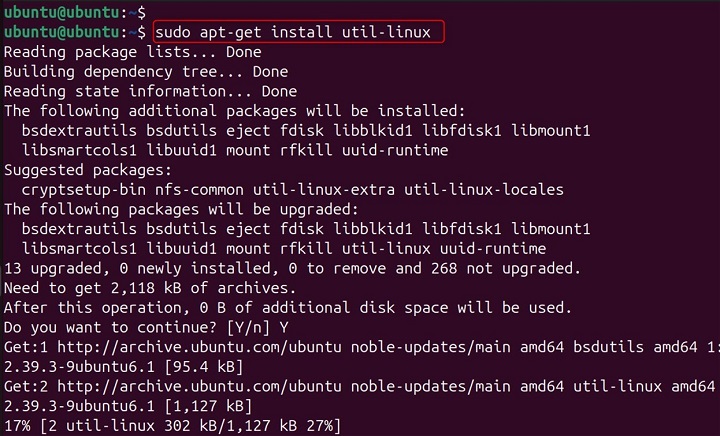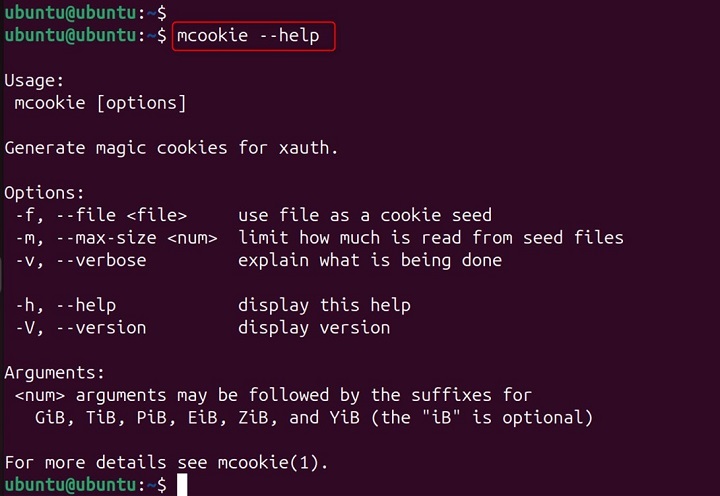
mcookie Command in Linux
The mcookie command in Linux is a utility used to generate random 128-bit hexadecimal numbers, often referred to as "magic cookies." These cookies are typically used for authentication purposes, such as in X Window System sessions or for creating unique session identifiers.
Table of Contents
Here is a comprehensive guide to the options available with the mcookie command −
- Understanding mcookie Command
- Syntax of mcookie Command
- How to Use mcookie Command in Linux?
- Examples of mcookie Command in Linux
- Advanced Usage of mcookie Command
Understanding mcookie Command
The mcookie command generates a random 128-bit hexadecimal number, which can be used as a unique identifier or token. This command is part of the util-linux package, which includes a variety of essential system utilities. The generated magic cookie is often used in scenarios where a unique and unpredictable value is required, such as in session management, authentication, and cryptographic applications.
Installing the util-linux Package
Before using the mcookie command, you need to ensure that the util-linux package is installed on your system. This package is typically included by default in most Linux distributions. However, if it is not installed, you can install it using your package manager. For example, on Debian-based systems like Ubuntu, you can use the following command −
sudo apt-get install util-linux

On Red Hat-based systems like CentOS, you can use −
sudo yum install util-linux
Syntax of mcookie Command
The basic syntax of the mcookie command is as follows −
mcookie [options]
options − Various options that modify the behavior of the command.
How to Use mcookie Command in Linux?
The mcookie command is straightforward to use and does not require any arguments by default. When executed, it generates a random 128-bit hexadecimal number and prints it to the standard output.
Generating a Magic Cookie
To generate a magic cookie, simply run the mcookie command without any arguments −
mcookie

The output will be a random 128-bit hexadecimal number, such as −
This value can be used as a unique identifier or token in various applications.
Using the --file Option
The --file option allows you to specify a file from which to read random data. This can be useful if you want to use a specific source of randomness, such as a hardware random number generator.
mcookie --file /dev/urandom

In this example, the mcookie command reads random data from /dev/urandom and generates a magic cookie.
Using the --version Option
The --version option prints the version number of the mcookie command and exits. This can be useful for verifying the installed version of the utility.
mcookie --version

The output displays the version number of the mcookie command.
Examples of mcookie Command in Linux
To further illustrate the power and versatility of the mcookie command, let's explore some practical examples of how it can be used in real-world scenarios.
Generating a Session Identifier
In web applications, session identifiers are used to track user sessions. You can use the mcookie command to generate a unique session identifier.
SESSION_ID=$(mcookie) echo "Session ID: $SESSION_ID"

In this example, the mcookie command generates a random session identifier, which is stored in the SESSION_ID variable and printed to the standard output.
Creating a Unique Filename
When creating temporary files, it's important to ensure that the filenames are unique to avoid conflicts. You can use the mcookie command to generate a unique filename.
FILENAME="/tmp/file_$(mcookie).txt" touch "$FILENAME" echo "Created file: $FILENAME"

In this example, the mcookie command generates a unique filename, which is used to create a temporary file.
Generating a Random Password
You can use the mcookie command to generate a random password for user accounts or other secure applications.
PASSWORD=$(mcookie) echo "Generated password: $PASSWORD"

In this example, the mcookie command generates a random password, which is stored in the PASSWORD variable and printed to the standard output.
Using mcookie in a Script
You can incorporate the mcookie command into a shell script to automate tasks that require unique identifiers or tokens. Here is an example of a script that generates a unique identifier and writes it to a file −
#!/bin/ IDENTIFIER=$(mcookie) echo "Generated identifier: $IDENTIFIER" echo "$IDENTIFIER" > identifier.txt echo "Identifier saved to identifier.txt"

Save this script as generate_identifier.sh and make it executable −
chmod +x generate_identifier.sh

You can then run the script to generate a unique identifier and save it to a file −
./generate_identifier.sh

Advanced Usage of mcookie Command
The mcookie command offers several advanced options that allow you to customize its behavior. Here are some of the most commonly used options −
- --file file − Read random data from the specified file.
- --version − Print the version number of the mcookie command and exit.
- --help − Print the usage message and exit.
Using a Custom Source of Randomness
You can specify a custom source of randomness using the --file option. This can be useful if you have a specific requirement for the source of random data.
mcookie --file /dev/random

In this example, the mcookie command reads random data from /dev/random and generates a magic cookie.
Displaying Help Information
If you need help with the mcookie command, you can use the --help option to display the usage message.
mcookie --help

The output will display the usage message, including available options and their descriptions.
Conclusion
The mcookie command in Linux is a powerful utility for generating random 128-bit hexadecimal numbers, also known as magic cookies. By understanding how to use this command and its various options, you can effectively generate unique identifiers and tokens for a wide range of applications, including session management, authentication, and cryptographic purposes.
Whether you're generating session identifiers, creating unique filenames, or generating random passwords, the mcookie command provides the flexibility and control you need.